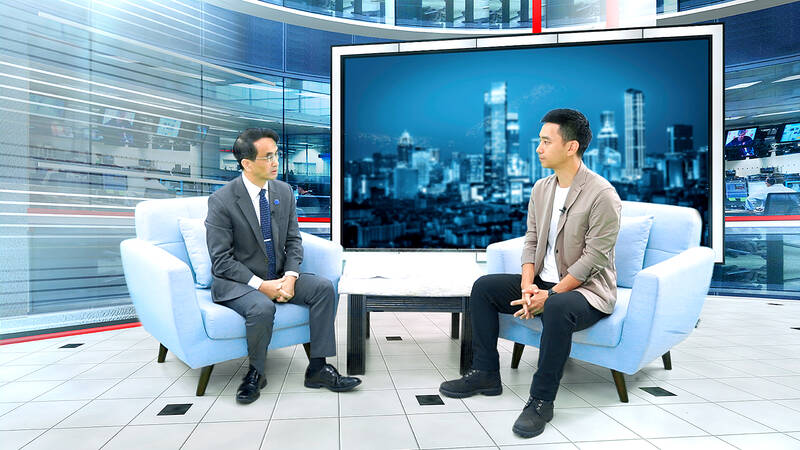Taiwan is developing a new satellite constellation that would be capable of monitoring Chinese missile movements and submarines through clouds and at night, Taiwan Space Agency Director-General Wu Jong-shinn (吳宗信) said in an interview yesterday.
The agency began work on the Formosat-9 constellation earlier this year, and the program’s centerpiece is a synthetic aperture radar (SAR) system, he told the Liberty Times (the sister paper of the Taipei Times).
Assuming good orbital placement, SAR-bearing satellites can detect objects on Earth in adverse weather conditions or darkness that would have made optical imaging systems ineffective, Wu said.

Photo: Chang Chia-juei, Taipei Times
The ability of SAR satellites to observe at night would enable Taiwan to conduct up to six satellite passages per day to surveil sensitive Chinese sites, including submarine bases in Haian and nuclear missile silos in Xinjiang, he said.
The higher rate of passages would mean pattern-of-life analyses could be conducted on Chinese forces after a month of satellite operations, which would be a boon to national security, he said.
Satellite imagery technology has significant potential for civilian use, as Formosat-5 showed in 2021, when the constellation detected a 15-hectare landslide in Kaohsiung and provided key information that helped the relief effort, Wu said.
The agency’s multispectral imaging-capable satellites were utilized by the nation’s agricultural mission to fight a banana blight in Paraguay, he said.
Starting this year, the Taiwan Space Agency is to launch eight Formosat-9 optical satellites, including six 1m-resolution units and two hyper-resolution (or 50cm) units, he said.
In February, the agency inaugurated the B5G project to launch low Earth orbit communication satellites as part of an effort to reduce the nation’s reliance on undersea Internet cables, which are susceptible to accidental damage and sabotage, he said.
Possessing a satellite-based telecoms network is a vital component of national defense, as it makes a nation’s digital infrastructure harder to disrupt, Wu said.
In the Russia-Ukraine war, Elon Musk’s Starlink has played an important role in sustaining Ukraine’s ability to resist the invaders, he said.
Ukrainian President Volodymyr Zelenskiy had made a point of streaming from Kyiv at various points of the conflict to assure people that the government still stands, Wu said.
According to the agency’s estimates, ensuring uninterrupted telecommunications in Taiwan would require a constellation of 120 low Earth orbit satellites each weighing 200kg to 300kg, which is similar to the technical specifications of Starlink, he said.
Although the nation lacks the wherewithal in rocketry to launch that many, it can be overcome by means other than a purely indigenous effort, while Taiwan’s technology industry has the potential to produce the satellites itself, Wu said.
The age of sixth-generation non-terrestrial networks is likely to be in about five to six years, and Taiwan should prepare to claim a place in the supply chain of that technology, he said.

‘CORRECT IDENTIFICATION’: Beginning in May, Taiwanese married to Japanese can register their home country as Taiwan in their spouse’s family record, ‘Nikkei Asia’ said The government yesterday thanked Japan for revising rules that would allow Taiwanese nationals married to Japanese citizens to list their home country as “Taiwan” in the official family record database. At present, Taiwanese have to select “China.” Minister of Foreign Affairs Lin Chia-lung (林佳龍) said the new rule, set to be implemented in May, would now “correctly” identify Taiwanese in Japan and help protect their rights, the Ministry of Foreign Affairs said in a statement. The statement was released after Nikkei Asia reported the new policy earlier yesterday. The name and nationality of a non-Japanese person marrying a Japanese national is added to the

AT RISK: The council reiterated that people should seriously consider the necessity of visiting China, after Beijing passed 22 guidelines to punish ‘die-hard’ separatists The Mainland Affairs Council (MAC) has since Jan. 1 last year received 65 petitions regarding Taiwanese who were interrogated or detained in China, MAC Minister Chiu Chui-cheng (邱垂正) said yesterday. Fifty-two either went missing or had their personal freedoms restricted, with some put in criminal detention, while 13 were interrogated and temporarily detained, he said in a radio interview. On June 21 last year, China announced 22 guidelines to punish “die-hard Taiwanese independence separatists,” allowing Chinese courts to try people in absentia. The guidelines are uncivilized and inhumane, allowing Beijing to seize assets and issue the death penalty, with no regard for potential

‘UNITED FRONT’ FRONTS: Barring contact with Huaqiao and Jinan universities is needed to stop China targeting Taiwanese students, the education minister said Taiwan has blacklisted two Chinese universities from conducting academic exchange programs in the nation after reports that the institutes are arms of Beijing’s United Front Work Department, Minister of Education Cheng Ying-yao (鄭英耀) said in an exclusive interview with the Chinese-language Liberty Times (the Taipei Times’ sister paper) published yesterday. China’s Huaqiao University in Xiamen and Quanzhou, as well as Jinan University in Guangzhou, which have 600 and 1,500 Taiwanese on their rolls respectively, are under direct control of the Chinese government’s political warfare branch, Cheng said, citing reports by national security officials. A comprehensive ban on Taiwanese institutions collaborating or

STILL COMMITTED: The US opposes any forced change to the ‘status quo’ in the Strait, but also does not seek conflict, US Secretary of State Marco Rubio said US President Donald Trump’s administration released US$5.3 billion in previously frozen foreign aid, including US$870 million in security exemptions for programs in Taiwan, a list of exemptions reviewed by Reuters showed. Trump ordered a 90-day pause on foreign aid shortly after taking office on Jan. 20, halting funding for everything from programs that fight starvation and deadly diseases to providing shelters for millions of displaced people across the globe. US Secretary of State Marco Rubio, who has said that all foreign assistance must align with Trump’s “America First” priorities, issued waivers late last month on military aid to Israel and Egypt, the